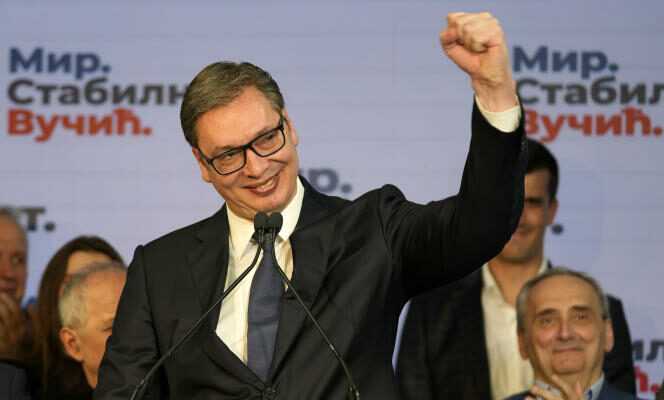With his fist raised, the outgoing Serbian head of state Aleksandar Vucic claimed a landslide victory in the presidential election on Sunday April 3. “There was no suspense at any time”he launched in his victory speech, congratulating himself on having won a second five-year term in the first round with around 60% of the vote.
“I am happy that a large number of people voted and demonstrated the democratic nature of Serbian society”continued the one who was successively deputy prime minister and prime minister before becoming president.
Voters were called upon to appoint their head of state, their 250 deputies as well as several municipal councils, including that of Belgrade, the capital.
Aleksandar Vucic, 52, said his Serbian Progress Party (SNS, centre-right) had won almost 44% of the vote in the legislative elections. “We are about to form a government on our own but together with the Hungarian Minority Party we have more than enough votes to form a majority”he added.
The dominance of the ruling coalition should, however, be less hegemonic than in the outgoing parliament. Official results are not expected to be released until Monday evening.
“Peace and Stability”
Russia’s invasion of Ukraine at the end of February changed the course of the campaign which should have focused on the environment, corruption and rights in this Balkan country of seven million inhabitants candidate for the Union European.
But Aleksandar Vucic, used to playing rival influences from East and West, seized the war to his advantage. In a country suffering as elsewhere from the coronavirus pandemic, he presents himself as the only one capable of helming the ship in stormy weather. He campaigned under the slogan ” Peace. Stability. ».
“The influence of the Ukrainian crisis on the elections was enormous”recognized the president. “Serbia has leaned dramatically to the right” with the entry into parliament of small pro-Russian nationalist parties, he noted.
The government has moved cautiously to manage the crisis in Ukraine by officially condemning Russia at the United Nations, while refraining from any sanctions against Moscow, while many Serbs support the Kremlin war. Some opposition parties share these pro-Russian views. The others dared not speak out for fear of displeasing pro-Moscow voters.
NGOs reported incidents and violence during the ballot, while opponents denounced attempts by the SNS to intimidate voters in polling stations. Pavle Grbovic, leader of a centre-left opposition party, claimed he was attacked by SNS activists while trying to film fraud in Belgrade. Aleksandar Vucic denied any irregularity.
Serbs from Kosovo, the former southern province never recognized by Belgrade, boarded 40 buses to take part in the elections in neighboring Serbia, Pristina having refused to organize the electoral operations on its soil.
Opposition Breakthrough
Only a few months ago, the opposition seemed to have made a breakthrough in the country of less than seven million inhabitants. In January, Aleksandar Vucic canceled a controversial lithium mine project that mobilized tens of thousands of protesters, a reversal rarely seen in his decade in charge.
The opposition assured that it had made a breakthrough in the municipal elections in Belgrade without official results being available. “We turned on the light”reacted the main rival of Aleksandar Vucic, retired general Zdravko Ponos. “That’s why so many people went to vote, they weren’t afraid. We are not going to spoil this”.
Aleksandar Vucic went to the ballot armed with advantages. During his long reign, he tightened his grip on all levels of power, including de facto control of institutions and almost all of the media. He enjoys a large electoral base made up of civil servants and their relatives, according to analysts. In the months leading up to the campaign, the president also doled out financial aid, making his critics say he was looking to ” to buy “ voices.
